#hypocaust
Text
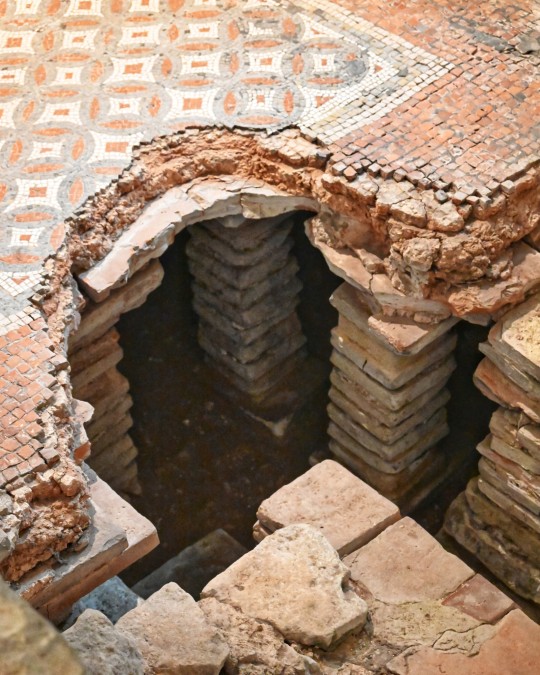
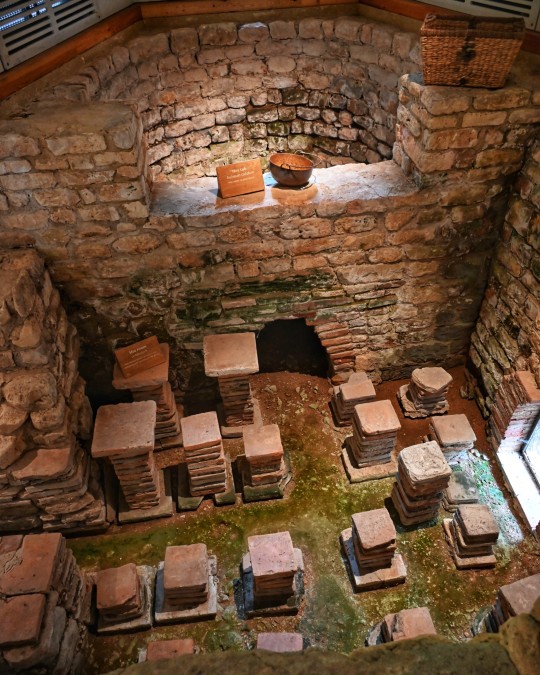
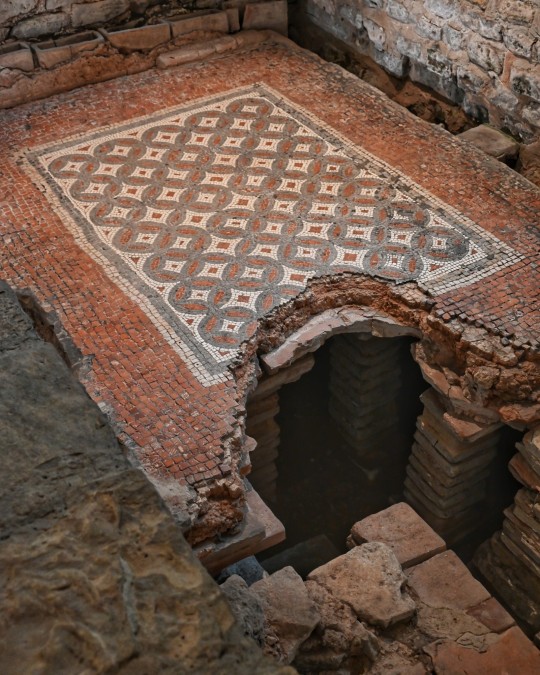
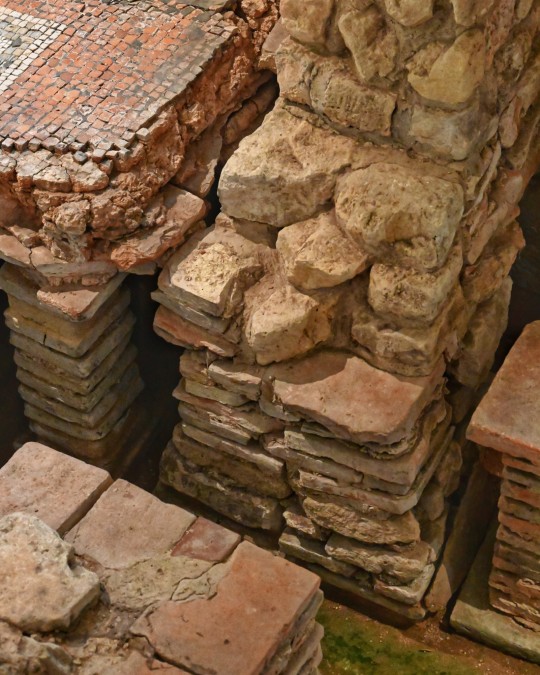
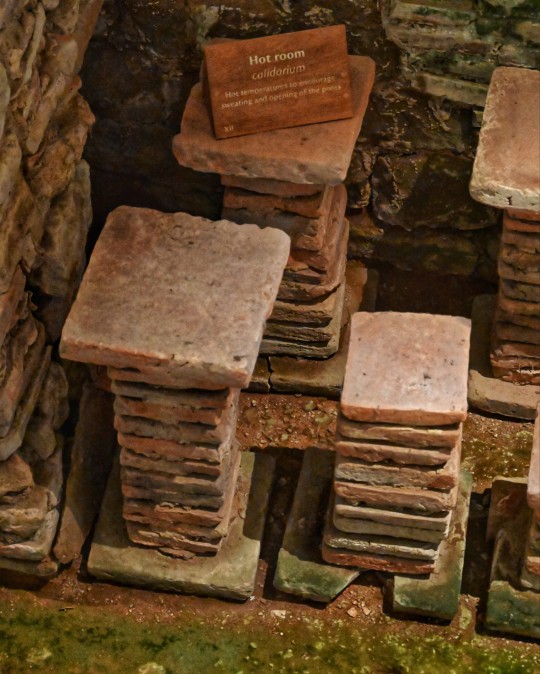


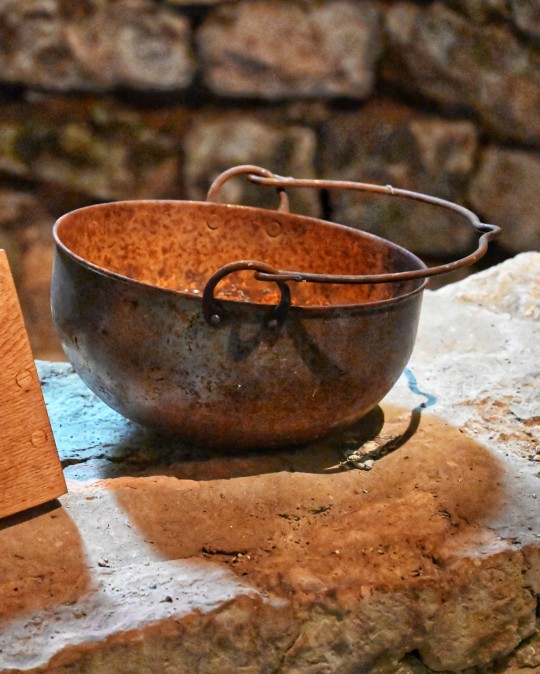
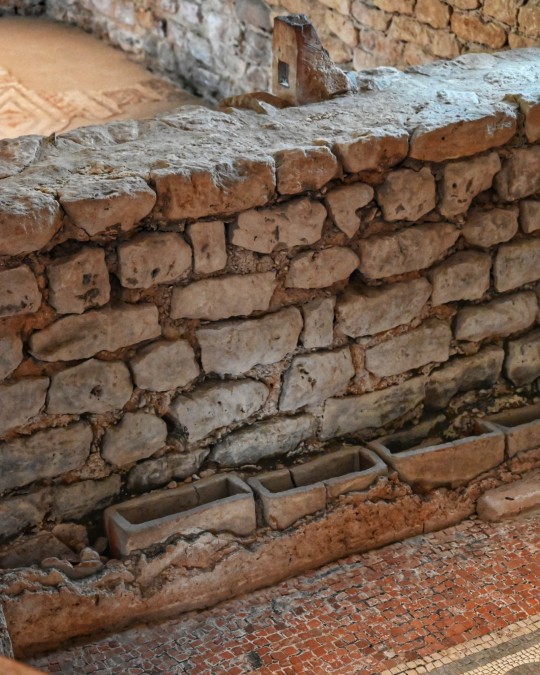
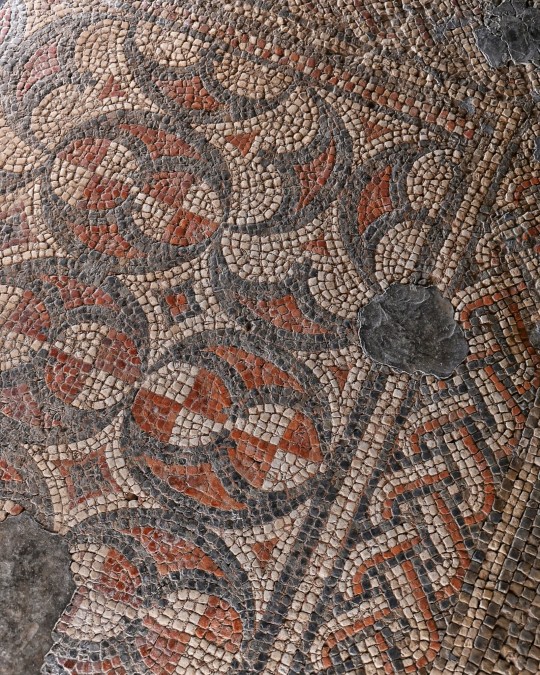
The baths at Chedworth Roman Villa, Gloucestershire.
#roman#roman baths#roman living#roman bathhouse#bathing#relic#mosaics#hypocaust#tiles#pottery#ancient living#ancient craft#Chedworth#roman britain#roman villa#archaeology
873 notes
·
View notes
Text
Archaeologists in Germany have excavated a 2,000-year-old Roman villa. Not only was this luxury home fitted with frescoed walls, but the elite residents also enjoyed underfloor heating!
65 notes
·
View notes
Text
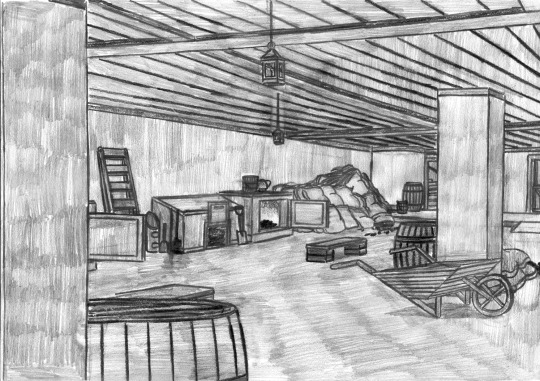
Can you reheat the castle up it's getting to cold.
0 notes
Note
Floor heating actually precedes the concept of first world countries! They already existed during ancient Rome! :D
ok hold on i need to look this up, i must understand how tf this works, i can only think of the electricity bills
#lua answers#luna my beloved#ok i looked it up. what on earth.#ik that if its done properly its safe but man im too paranoid of the fire and shock hazards lol#i only checked the wiki but it seems like the hypocaust was more of a wealthier peoples thing. which i can imagine bc oh god the maintenanc
5 notes
·
View notes
Note
What did hywel dda's kids do? (Sorry if this sent twice tumblr keeps thinking im a robot)
Yeah we've all been there
Okay so the issue is Old to Medieval Welsh inheritance laws. Post-Romans, Wales was split into a handful of kingdoms, Saxons having a go in the east (and failing lol, get mountained idiots), and all the engineers who remembered how to make hypocaust central heating were gone. And then along comes Hywel Dda, with a dream and also an army.
He's already king in his own kingdom, right, but his brother dies and leaves him Seisyllwg which he joins with Dyfed to create Deheubarth; he also Gwynedd and Powys from his nephews, this giving him the north. As a final flourish, he forges an alliance with a Saxon king, and thus gets Gwent and Glywysing; meaning, in short, that for the first time in history, the actual country of Wales is formed and united under one ruler. He was, very literally, the first King of Wales.
And what he does with that power is amazing. Proper golden era shit. He enacts the Laws of Hywel Dda, a legal system based on compensation and rehabilitation, to tackle crime in place of the "Just hang them" system - it's a justice system that's notable for its incredibly progressive protections and rights for women, in fact, because the rest of Europe was LACKING in that regard. He makes it illegal for someone to be charged for stealing bread, as long as they were 'starving' i.e. had passed through two towns without eating before the theft. He commences progressive healthcare systems. He starts projects to educate the masses. He does many fabulous and wonderful things, and probably gives great head.
And then he dies and, in accordance with Welsh inheritance laws, splits Wales back into three kingdoms to give a piece each to his three sons, and Gwynedd is reclaimed by the nephews, and that's that.
Well. It was nice while it lasted.
255 notes
·
View notes
Text
Right, okay, there's no way I read this when I was wee, because I'm pretty sure I would have remembered this:
“Well, very long ago, on the spot where the Wild Wood waves now, before ever it had planted itself and grown up to what it now is, there was a city—a city of people, you know. Here, where we are standing, they lived, and walked, and talked, and slept, and carried on their business. Here they stabled their horses and feasted, from here they rode out to fight or drove out to trade. They were a powerful people, and rich, and great builders. They built to last, for they thought their city would last for ever.”
“But what has become of them all?” asked the Mole.
“Who can tell?” said the Badger. “People come—they stay for a while, they flourish, they build—and they go. It is their way. But we remain. There were badgers here, I’ve been told, long before that same city ever came to be. And now there are badgers here again. We are an enduring lot, and we may move out for a time, but we wait, and are patient, and back we come. And so it will ever be.”
“They built to last, for they thought their city would last for ever.” That's surely the Romans. That's how we think of Roman architecture, compared to that of any other time period.
I'm pretty sure wee!me would never have forgotten a detail like the fact Mr Badger's house is possibly built into someone's old hypocaust. :D
Also, just this:
We are an enduring lot, and we may move out for a time, but we wait, and are patient, and back we come. And so it will ever be.
Beautiful.
45 notes
·
View notes
Note
(Pentiment Act III spoilers)
I'm replaying Pentiment after finding out about Thomas's use of the aqueducts for transportation, and I noticed something confusing. After the dinner where the baron makes everyone mad at him, Andreas leaves at compline to head home and notices a "ghost" jumping across the aqueduct gap (much like Andreas and Casimir will later do). This is likely Thomas, given his use of the ruins. Andreas then walks from the meadow to the church, where he meets Amelie and is shortly reassured by Thomas. As far as I can tell, this all takes place during compline without any hours passing between the "ghost" sighting and the Amelie meeting. Was Thomas able to get from the aqueducts near the mill to the church via the mithraeum as quickly as Thomas walked from his ghost sighting in the meadow to the church, or did Andreas see an actual ghost? Or did I miss an hour passing during compline
Pentiment spoilers below.
It's Sister Amalie, who was returning from delivering a letter to Prior Ferenc's house, and would later return to climb up into the nuns' kitchen to deliver a letter to Sister Matilda in the dormitory (where she was smelled by Sister Magarete).
While Andreas is talking to Til Kreutzer, she runs the rest of the distance of the aqueduct, squeezes through the rubble, runs down past the baths, through the hypocaust to the mithraeum, and climbs up into her cell, where she dramatically has a vision just as Andreas walks by.
56 notes
·
View notes
Note
Also, I take issue about Roman heated floors being the hallmark of cool vampire civilization. SLAVES did that in Rome. The thing they're glorifying is slavery.
Are you referring to that scene where Lenore mentions that they use pipes to channel waste heat? Because, well. I'm not surprised in the slightest that they're glorifying slavery, considering the context 🙃 just par for the course for the show whose very philosophy is entrenched into British imperialism!
but yeah, funny that Lenore is quick to flaunt that ohhh they're so advanced, and ahhh they're not monsters because they keep Hector warm (except when they wash him with freezing water, i swear if only he had one more braincell), but she accidentally implied that they keep slaves in the castle so that the hypocaust can function. And aren't some of the people Isaac kills in S4E6 humans? 🤔
obv they're a castle of evil vampires, so the idea of them having slaves isn't so shocking. but you know. funny that they gloss over it because we need to emphasize how cool our elves vampires are.
(also, apparently hypocausts fell in disuse after the fall of the Western Roman Empire, but still persisted for longer in the Eastern Roman Empire. To be fair, I'm not sure how common it was at the time, but it wasn't lost technology like Lenore/the show wants us to think)
12 notes
·
View notes
Note
Could I ask you about Viserys I? In a transcript for a deleted scene of HOTD, Viserys is looking at a statue of Jaehaerys I and lamenting that he is somehow expected to do better than him (since his reign followed his). I read somewhere that medieval kings were remembered by either wars fought or by what they built. Viserys' reign was almost entirely peaceful (except for the Stepstones conflicts). What do you think Viserys could have built (in terms of infrastructure, fortifications, etc.) during his reign to improve the kingdom?
Given the Stepstones conflict, Viserys might have done well building out a larger harbor in King's Landing, with multiple wharves and a solid lighthouse, to improve the facilities for the Royal Fleet and improve trade (and thus tariffs and harbor fees). He could have build a place of great worship (remember, the Great Sept of Baelor doesn't exist yet). He could have invested more into completing Barth's vision for King's Landing - Barth had ideas on sewers and other sanitation that were very on the nose. While the winters aren't as devastating as they are up north, having some buildings with old Roman-style hypocausts might help, particularly the poor to help warm themselves during the winter. He might have built a better defensive network of watchtowers in the south along the Dornish border to discourage border raids, perhaps coupled with offers of trade to help resolve the Dornish issue favorably to Westeros - I doubt he'd actually be able to secure a marriage and treaty, but improving relations while showing strength is typically what you have to do in medieval statecraft.
Thanks for the question, Anon.
SomethingLikeALawyer, Hand of the King
36 notes
·
View notes
Text



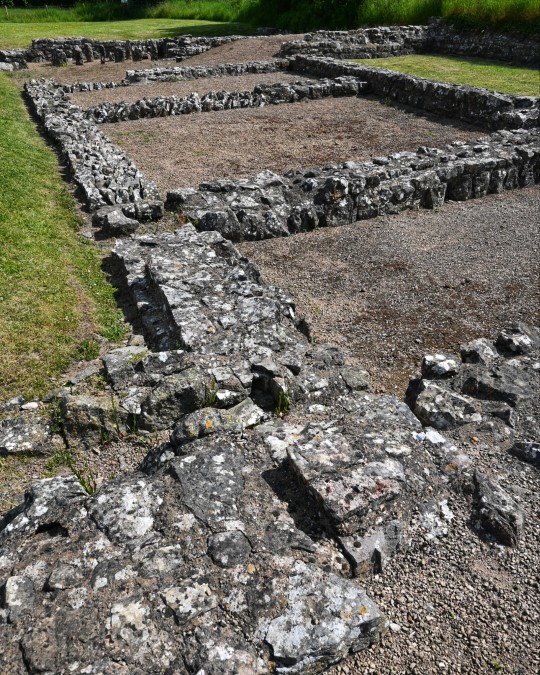

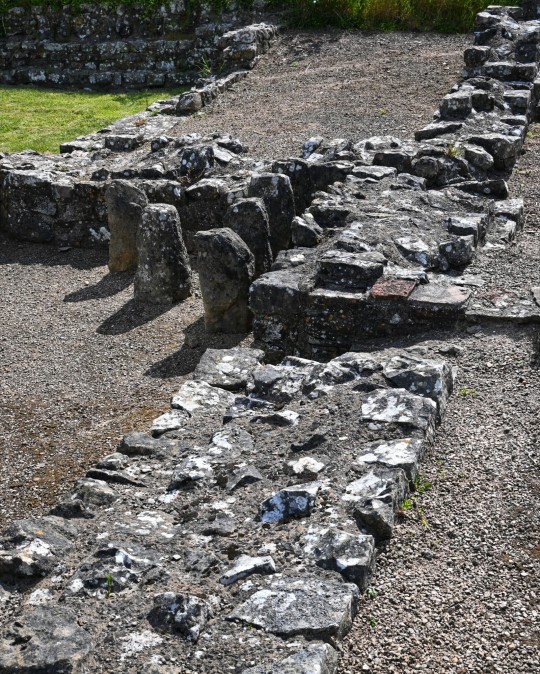
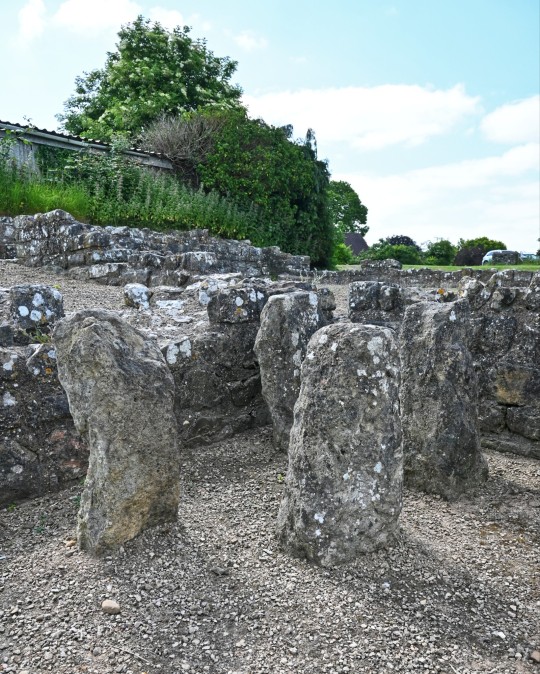
Caerwent Roman Courtyard House, Caerwent, Monmouthshire, Wales
#roman villa#roman living#romans#roman empire#archaeology#wales#roman ruins#roman building#hypocaust#outdoors#roman design#ancient craft#ancient living#stonework
66 notes
·
View notes
Text

A method of heating was used in Ancient Rome baths and public buildings, using a Hypocaust. A hypocaust is essentially a centralized heating system that produces hot air under the flooring of the room, which could also be transmitted to the walls using a series of pipes. The hypocaust was raised above the ground using pile stacks which were pillars that supported a layer of tiles. A layer of concrete was laid on the tiles, finished with the tiles of the flooring of the room above. It consisted of a furnace from which hot air circulated through the clay tiles into the rooms above, thus warming up the space.
461 notes
·
View notes
Text
What Sweetness You Can
For Valentine's Day, I thought I'd write a fluff piece about bees. St. Valentine is the saint of beekeepers too, you know. It got away from me. It's still fluff, and can mostly be described as 'Old Witchers having a pretty good time' 7,502 words of it.
>-------------<
There were bees in the walls of Kaer Morhen.
Technically, they had their own room, in the wing opposite where the remaining Witchers kept their quarters. Their door was clearly marked, and generally they came and went from the windows. Occasionally one or more would find their way inside the keep, but the majority lived cozily in their room. Generally speaking they were shooed out peacefully. If any ever found their way into the hypocaust that kept the ground floor of the keep warmer than it could be, well, as long as they didn’t try to set up a hive there.
In the summer when the keep was even more empty, Vesemir found their droning hum somewhat soothing, and would even talk to them, in the traditional way, telling them of events that took place in the family. He would calmly chat as if they understood as he gently harvested thick honey combs, his care and centered calm being every bit as effective as the smokers that some bee keepers used. It was an old hive now, generations of swarms coming back to continue the line. Somehow, he liked to think that they told their children about the Witchers, the same way he told them.
The honey was good for brewing, for preserving food, for making poultices, and medicines, for trading, and fueling energy for the ever hungry metabolisms of the Witchers. Perhaps it was the harshness of the world that made them starving for sweetness in their food. More than once he’d seen a bowl of porridge drowned in tawny gold so deep that none of the oats poked out.
The wax was invaluable for armor, ointment and candles as well sealing and preserving.
However, the biggest problem with using it as a trade good was that unsupported honeycombs did not travel particularly well. Which meant jars. The valleys nearby had plenty of browse for goats and horses, but not a lot of clay, even if he was capable of making his own. It wasn’t as if his foolish pups didn’t need jars and vials for their potions, but he had no skill in glass blowing. (In his youth, a Witcher with a wooden leg from the knee down had learned the skill, and for a time they’d kept the keep well supplied. Long past now though some of his work remains.) So that meant not only getting the jars down the mountain- it meant getting empty ones back up.
He had an advantage in that he took the trail in early summer, rather than fall or spring, when things were more settled. It would never be easy, or entirely safe, but it was a simpler task. There was even a shortcut down a pass that became impassable early- sometimes it would even be too difficult to use midsummer.
Every year had it’s own challenges, so it was best to stay flexible and alert. He wasn’t as old as all that, after all, no matter what the pups teased at. This year’s particular challenge was that after the winter, the town he usually traded goods in wasn’t having a market quite big enough to have all of the supplies he needed. He would have to travel further. The only traveling merchant that was there suggested he might as well go as far as the city. They also offered to take the goods off his hand for a fraction of their worth if he didn’t want to travel himself. He dismissed that idea; the supplies he got in trade helped keep the keep standing and feeding it’s last members. So he would travel to Ard Carraigh.
Not something he did often or was particularly fond of. This close to the mountains, Witchers passed through fall and spring, so there weren’t many contracts to pick up. Beyond that, despite his armor and twin swords- (he’d hardly leave Kaer Morhen unprepared) people seemed a little confused at a Witcher with a wagon pulled by a pair of donkeys. (He liked donkeys. They were intelligent and much heartier than most horses.) It made them a bit friendlier, but less likely to trust he could handle things. Fortunately, there were plenty of people who’d met him before. Vesemir would sometimes feel the itch for the Path and the valleys below the mountains were far enough to scratch it.
It made for an uneventful trip, barring a few bandits who thought a wagon guarded only by an old man looked like a tempting target.
As the last of them fled, he sighed at the faint instinct to chase them down. It wasn’t his job to rid the countryside of bandits. That was the only interesting thing that happened, the rest was the scent of green growing things and mile after mile of road disappearing beneath the donkey’s feet.
Once, Ard Carraigh had been a walled city. By the time Vesemir left the path it had already spilled past the walls, spreading out into new residential areas, guild houses, and at the edge, always at the edge, the farms that kept the city fed. He found an inn that had always been kind to Witchers- outside the walls of the main city- and inspected the craftsmen’s quarters.
A furrier waved him over as he passed.
“Witcher, ho- over here.”
Not sure if he should expect a contract or an insult, Vesemir did. The furrier carefully took another look at him and gave a nod.
“You’re one of the Wolves, right? I do business with them most falls. It’s kind of out of time, but do you have anything interesting?”
“Interesting how?”
“Unusual colors, or monster fur, that stuff sells great, once it’s treated.” he gave an amused expression. “Frankly, you people bring in nicer stuff than other trappers I’ve worked with.”
A great bundle of furs were in the cart, padding out the jars of honey. With all of the hunting they did in the winter, there was more leather and fur than the handful of remaining wolves could use.
“I have some, I can bring them by.” Vesemir was pleasantly surprised that it was this easy.
“A pleasure.” the furrier offered his hand. “The other Witcher that I saw the other day only had some rabbit and deer hide.”
Vesemir was curious to hear about that. It was a bit odd that another Witcher was in this area at this time, but as they were wanderers it wasn’t unheard of. He wondered if he knew them, and continued on.
Over dinner, the innkeep told him that there would be a big market in a few days, really a summer faire and he’d probably get a good price for the honey if he sold it there. He’d already traded a decent crock for his room and board. He’d first met Erik when he was young and just helping his father in the stables, but the man had grown into himself and taken over running it. Erik had heard rumors about a Witcher in town days before Vesemir arrived, substantiating what the furrier had said. Trusting the young innkeep, Vesemir would wait those days. It wasn’t as if he had a real time table. What was left at Kaer Morhen could tend to itself for a while.
That left him with time on his hands. In the morning he checked the nearest message board, feeling the buzzing anticipation of possible combat. Things seemed fairly peaceful but there probably would be something. He did not expect to encounter the other Witcher people had been talking about, and expected knowing him even less.
The Witcher was standing in front of the board, feet spread he read through the notices. He wore his swords on his hips, shorter and lighter than the ones Vesemir carried. He was favoring his right side. Not a lot, just enough that Vesemir noticed. His hair was tied back in a tail, more gray and white than black. As Vesemir stepped up beside him, eyes like old honey, dark gold with red undertones, flicked over at him, and a small smile went over his face.
“Now what are you doing this far north, Guxart?” Vesemir asked. “Really, I never expected to see you again, all of your letters have been no further north than Toussaint.”
“I didn’t expect to see you either, Old Wolf. Not here.”
Their shoulders bumped in greeting.
“Where did you expect to see me?” Vesemir asked.
“Closer to the mountains.”
“No market. The keep bees were over productive this spring. More than I can handle, and I’m out of crocks and jars. I’ve got an old barrel filled with raw combs, and it wants to escape.”
The other old Witcher sighed, perhaps a bit wistfully.
“I miss the bees. Humms like chaos.”
Vesemir grunted agreement.
“Wagons would make for poor hives.”
“Worse homes than I thought as well.”
There was clearly something there, lurking like a monster under the surface of a lake, but for now, Vesemir let it hide.
“Cleared out all the good contracts?” he asked instead.
He hadn’t as it happened. He’d been sticking to the smaller, easy ones, which were more nuisances than real problems. Drowners in a aqueduct. Some wild dogs causing too much trouble for a farm. Tracking down a missing fiance who had gotten cold feet. Nothing big.
Witchers didn’t typically corporate, but Vesemir and Guxart had known each other for a long time. It hadn’t started the smoothest, but they did bond over being the eldest in their school, and trying to keep the younger Witchers sharp and healthy. After knowing someone long enough, the friendship was a steady bond, that stretched across land and bitter history.
The two old Witchers took care of a zegul together- which were nearly as prevalent as drowners, really. They just showed up whenever men built sewers. In the stinking privacy of the dim tunnels, and the quiet after the last blow landed Vesemir struck.
“How long have you been injured?” he asked. Guxart went still like a startled cat, and huffed.
“Bad break over the winter. Didn’t set well or heal well. It’s getting better.”
“Still a little weak on the right.”
“Well, glad you stood there then.” he grumbled cleaning his sword off. “Not healing like I used to.”
“Getting old?”
“I’m not the only one grey around the muzzle.” the Cat said sharply, but was drawn out of his annoyance by Vesemir moving into his personal space and pressing their foreheads together. They shared breath in the stinking sewer and it felt better for it. Vesemir rubbed his thumb softly back and forth under Guxart’s ear.
“Let’s get out of here, though. Cities stink back enough on the topside, this is no field of flowers.” Guxart grumbled, but knocked their temples together as he pulled away. “I’ll tell you the rest.”
Friendship was mixed with physical intimacy for them, reaching out for someone who understood.
Erik was only a little surprised when Vesemir returned dirty and with another Witcher in tow. He just brought buckets of hot water to them, and offered to bring their clothes to the laundress.
Soon enough they were settled in Vesemir’s room with a brace of stewed pigeons care of the dovecot above the stable.
“Sometimes,” Guxart said, letting the smell of fresh bread fill his nostrils. It was too late in the day for it to be hot, but it still smelled delicious. “I think you have it much easier, with fewer cubs to keep track of. Or that I failed somehow. Or I’m just too old to keep up.”
“You’re doing fine.” Vesemir tried to assure him. After a moment thought he produced a jar of honey, and let the Cat soak his bread in it.
“I’m not. Bad enough we’re known as hired killers; even Vipers would hesitate to kill another Witcher. There are too few of us.” Viciously he bit into the bread, licking after each bite to keep the honey from escaping. It occupied him entirely for a few long moments, and the spike of anger settled back down to a low simmer. “I-” he gave a harsh laugh, sucking on a sticky thumb “Am no longer welcome in Dyn Marv’s wagons.”
“That’s ridiculous.” Vesemir protested. “You-”
“I’m sure some of the kits will wonder where I’ve gone, but I’ve certainly been pushed out of the clowder.” He sighed deeply. “I’ve tried longer than perhaps I should have. Better Cats than I have gone off on their own. I know that Cats are banned from Kaer Morhen, but I’m hoping you’ll make an exception for an old moggy.”
“Don’t be ridiculous.” Vesemir snorted. "It was never all Cats. That’s just easier to say.”
Guxart gave a huff of a laugh.
“Don’t worry, I should be moving well enough in a few more months. Make myself useful.”
“Why wait?” he cupped a hand around his friend's neck and stroked his fingers across skin that was still soft. This time, Guxart’s eyes drifted shut and there was the faintest sound of a purr.
The pay from the zegul wasn’t much, but more than enough to pay the stall fee for the market festival. The furs had all gone to the furrier the day before it opened. Vesemir frankly didn’t care if the man sold them for more than he’d paid, since he’d paid a fair price. However the other goods were laid out below a canopy Guxart had rigged, putting them in shade. With their swords laid nearby in the wagon, they looked more like retired mercenaries than inhuman monster killers, and no one was more than a little intimidated. Not with the soft fragrant smell of honey on the air.
Slowly the stock of crocks and jars, each carefully sealed with wax and covered with a soft leather lid, leather dampened and shaped by being tied tightly over the jar, left the stall, replaced with coin and some useful trade goods. Also for offer there were a large range of whittled and carved objects, made by idle hands in the darkest months, as well as fine woolen thread from the same source, gathered from the soft undercoats shed by the hearty furry goats that were now mostly feral around the keep.
The head of the weaver’s guild came by to ask after the ichor based dye that made the Witcher’s clothes dark. Guxart preferred woad or indigo, the all-black favored by some Witchers a little much for him but he had what looked like an old beer jug filled with the stuff, contributing to the stall. He took pay in coin, as well as two bolts of undyed cloth, one wool and one linen. While for the most part Vesemir needed coin to supply the keep, he was willing to take trade for items he needed. Ingots of wax for ingots of iron, the large honeycomb in it’s barrel, half submerged in honey for sacks of flour.
By the end of the second day, there was hardly anything left.
“There you go Vesek.” Guxart teased, half draped over his friend. He was feeling much more relaxed now. “Aren’t you glad you came this far now?”
“It seems to have worked out.” he agreed, and gave a friendly headbutt. Guxart chuckled. “Now of course, I have to find a glassblower and potter to get jars and vials.”
Guxart’s smile got broader.
“I know a guy actually. I can get the glasswares. Standard array?” back when they’d see each other more, Vesemir had small variations on shape in his potions to make them easier to grab blind.
“How long have you been slinking around Ard Carraigh?” He asked in an amused rumble. It was good to be in the other man’s company, to let himself go, instead of being an authority for his pups. Guxart chuckled back.
“Long enough.” He’d been camping out in the woods outside the city until he was invited into Vesemir’s room, so he was quite pleased. Simple straw tic or no, the mattress was very forgiving to his battered bones.
“Well it wouldn’t hurt to divide the labor. I need to go to the potter’s.” He frowned at the mostly-empty cart. “Some of those were the crocks I use for preserving things.”
“And you’ll need plenty of those for winter.” he coughed a bit. “What do you think would warm your boys up to me?”
Vesemir raised an eyebrow at that.
“Oh that’s going to be a task.”
“Alcohol it is!”
Unsurprisingly the third day of the market fair didn’t just have them short on goods. The potter allowed that he had more crocks cooling in the kiln, due to a misunderstanding in timing, and he could do Vesemir a fairly good deal on them. Guxart smugly showed up with a sawdust filled crate that was packed as tight as an icehouse with potion sized vials. Enough to keep the Wolves in potions for years at least. He didn’t have quite as much luck with the jars. The amount of pots the potter had was impressive though.
Throughout this all, Vesemir was vaguely bemused. Some people would not meet his eyes, or went to the trouble to avoid him- or ignore him completely in the case of one shop owner. But the majority of the people he interacted with treated him as an older gentleman who they didn’t know. It was different. They clearly weren’t mistaking him for anything else, since he’d had a runner interrupt his shopping for one of the more affluent people in the city, who had heard there was a Witcher about and was having some trouble with his wine cellar. (While there was a spirit in the cellar, it was mostly upset that the servant in charge was siphoning off from the large barrels inappropriately, to sell under the table causing souring and other problems. Vesemir’s best guess was that the spirit had come in with a barrel of wine, and changed from a nature spirit to more of a house hob.) A simple enough job to catch the thief, and dispel worries about the spirit who would do more good than harm if treated properly. Not much in way of pay, but people rarely wanted to pay when it was discovered someone they previously trusted was a thief, and technically, Vesemir hadn’t gotten rid of the spirit in the wine cellar either.
When Vesemir came back to the inn, he saw Guxart on the roof, idle in the late-day sunlight, smoking a small clay pipe. At Vesemir’s approach, he propped himself up a bit, rearranging his seat on the slates.
“What are you doing up there?” Vesemir asked, more out of concern for Guxart’s still weak leg than any annoyance.
“It’s a good view.” the Cat returned tartly. “... Innkeep doesn’t like heights. Needed someone to check the roof slates where they met the chimney. Rooftops are absolutely cat territory, so I made myself useful.” He stared down at Vesemir who looked up at him, unimpressed.
“Can you get down?”
“... there’s a ladder round the back. My ego has taken enough hits, come up and enjoy the sunset.” After a few moments longer disapproving stare, he did, however, and they watched the sunset on the roof.
“I could have done it without.” Guxart said out of nowhere. “But the ladder was already out.”
“I’m sure you could have.” Vesemir passed the pipe back.
“It’s weird.”
“What?”
“People have been; well not calm, but more relaxed about Witchers. Not in all the little villages, but in larger places.”
“Places we wouldn’t want to go anyway.”
“Leave it for the young’ens.” he agreed. “Think it’s at least as good as when I started on the Path, back before King Lackowit started his nonsense.”
“I’ve found, as I get older, that words are an incredible weapon. M’boy’s Bard-”
“Dandelion, right?”
“Geralt calls him Jaskier. Some yellow flower.”
“Daffodil.” Guxart suggested. “Daisy.”
“Celandine.”
“Merigold.”
“Yarrow.”
“Pansy.” Guxart suggested slyly.
“Goldenrod.” Vesemir retorted.
For some reason that made them both dissolve into chuckles, like they were trainees escaping from work, not two of the oldest surviving Witchers on the continent.
“Well, none of my business.” Guxart gave one last chuckle. “So the bard.”
“He seems to be doing a one man Witcher rehabilitation service.”
“Insane.”
“Geralt said he hugged a Viper, and that he could feel his hair getting whiter.”
“And he lived? Huh. I doubt even my kits are that crazy.”
“At any rate, words. Words are changing the world. Where the songs get popular, Witchers are less of a threat. If you think about it, we didn’t change our behavior, other people’s words are what turned the world to shit.”
“It is a bit isn’t it?”
With the market done, and supplies acquired, it was time to head back to Kaer Morhen. The donkey heaved a great sigh at the now much heavier cart, but gamely pulled it along. Guxart’s horse- a short, sturdy mare who was getting a bit on in years- kept up fairly well. To Vesemir’s slight surprised, the black and white mare was just as trained to pull a cart as she was to be ridden.
The trail up to the keep was more than passable this time of year, just after midsummer, but still tricky. The Cat proved himself to be a more than capable driver- better in fact than Vesemir, so he let him take over.
Long before the walls of the keep came in sight, Vesemir was greeted. Bees rose from the greenery and flowers to circle around his head and crawl over the leather of his armor, as if examining it for nectar. Only for a few moments each then they returned to their tasks, the buzzing a very faint drone. It could be excused by pretending that it was due to gathering important ingredients and bundling them up, since he was foraging as they climbed the steep trail, but that would be a weak excuse. Finally Kaer Morhen appeared ahead of them.
Guxart had only seen it once before, and that was before the attack. He hadn’t even gotten this close then. Frankly, for a castle that had been laid siege to, it was in fairly good shape. The years of insufficient care had done their own damage. It was a place meant for many, inhabited by the few.
“Little drafty for a retirement cottage, Vesek.” he teased.
“Good thing I’m not retired just yet.” They were in front of the gates, which were shut tightly, some of the wood looking slightly newer than the rest. Guxart wondered what kind of key would unlock them, when Vesemir took a deep breath, a few steps back and a running leap.
Before he could say anything, he watched the Wolf climb hand over hand up a half-hidden chain that went to a counterweight, and disappear into what might have been a murder hole. It barely fit his shoulders.
He whistled, impressed.
A few moments later and the counterweight chain moved slowly, and the gate opened. He led the wagon through and into the courtyard.
“That was unexpected.”
“Well, if I came back to squatters, I’d have to scrub the blood off the floor and my knees aren’t what they used to be.”
They settled in fairly quickly. Supplies were stowed, and Guxart took the chance to get a look around. There was a garden taking up a back courtyard, looking a bit overgrown but not abandoned. There was a stable and a small fenced paddock inside the walls, with a heavy gate of it’s own leading to a field outside. The stable looked like the best maintained outbuilding. One southern facing courtyard help a glasshouse- remarkably intact, so probably mage-created glass. Everything seemed just a bit worn and under maintained. Under-maintained, but livable. He was quite impressed. He could see that at least one wing had lost half it’s roof, and there was an assortment of collapsed and half collapsed outbuildings whose purpose he couldn’t even guess at at this point. All signs reminding that this had once been more. Discovering that he had been staring into space for long enough that the sun had disappeared, he found his way back to Vesemir.
Guxart found that maintaining a castle, even a moldering one, was entirely a different task than wrangling a caravan, even if it had involved herding cats. Not that he was necessarily averse to hard work, especially when it came accompanied by a fairly soft bed, good food and hot baths. Not to mention fine company. With two pairs of hands in fair weather it was plain Vesemir had plans for the rest of the summer. If Witchers lived to old age, they hardened like oak. Strong, tough and lasting, with plenty of experience in doing things the wrong way to help them do things smarter.
Since it was a big change, Vesemir had taken the time to tell the bees about the keep’s new inhabitant shortly after they arrived. All signs pointed to them approving- or at least that’s what he told Guxart. Guxart was willing to buy it and nearly as calm as Vesemir when he helped with the fall harvest. Most of the young Wolves would panic a little when they stepped inside the bee’s room. Guxart moved carefully through it, and let the bees crawl over his skin, gently blowing them off the combs when needed. Despite having been harvested once already in the late spring, the bees had handily refilled the space with the flowers from the valleys and slopes around the keep. They might swarm soon, and the old witchers discussed if a second room would be better, or traditional skeps, and how far away the second hive room would have to be for optimum health. If they built and provided some sort of scaffold would it prevent the rippling stalactites of honeycomb.
Their time was well filled, and Vesemir felt a foreign sort of relaxation having company and help. Occasionally, a message bird would arrive (Guxart had replaced the dovecot, chittering under his breath the entire time, and would sometimes laze about in the sun watching the birds) with a request for a Witcher. This close to the mountains, monsters would periodically emerge, and the people who lived below them were used dto the Witchers. Sturdy hillfolk and farmers, they took care of what they could, and regarded Witchers to more strange than a longbowman, or a skilled blacksmith. They had skills that others did not, specialized to a specific task. One wouldn’t ask a blacksmith to make cordage, or a tanner to jar fruit.
When the messages arrived, they would ride out to the call. At first it was singly, one staying behind, and later both together. These contracts yielded more goods than coin, but at least they were paid.
The larders filling nicely, autumn overtook Kaer Morhen, and as the rain drove the leaves from the trees, and the world chilled, Vesemir started anticipating the Wolves’ return to their den.
There were perhaps ten remaining wolves, and Guxart could tell that the swordmaster had his favorites, the ones he spoke of the most fondly and frequently. A sad number for a pack. But better than the Gryphon’s loss, or the slow disappearance of the Manticores. There was no way to tell how many Bears survived; and the Cranes that were left wouldn’t crew a good sized boat. Last he heard, the Vipers were down to only a handful; part of him regretted the loss of Witchers, even of another school, but he’d never really felt comfortable around one anyway. The Cats, perhaps were the luckiest, the Caravan housing twenty or so on a regular basis, with strays coming and going like feral cousins. They were however, the most likely to turn on each other if things went sour. There were occasional clowders within Dyn Marv’s wagons, family like groups who always had each other’s backs.
And then there were fucking assholes.
Wolves were supposed to be different; but that was something he’d have to see.
The world faded to browns and grays, broken with the green of various pines. The bees settled down in their room, humming to themselves as they slept in anticipation of winter. As the frost bloomed the remaining Wolves arrived at Kaer Morhen one by one, bringing what supplies they could from their year on the Path. Eskel, one of Vesemir’s favorites, arrived shortly after the frost hardened the trail, small crates of chickens carefully balanced over the croup of a fairly annoyed looking stallion. He seemed surprised at the presence of another old Witcher- and a Cat at that, but when his mentor didn’t comment on it beyond ‘he’s a good friend’ Eskel didn’t ask any further questions. He did keep an eye on Guxart however. The elder tolerated it for the most part, but he did disappear between to glaces from time to time. Just to keep the younger Witcher on his toes.
This time of year, Vesemir spent mornings up on a lookout- there was a part of the trail that was visible, and so was anyone coming up it- if you had Witcher sharp eyes or a telescope, and Vesemir had both. The revealing patch was about a day’s travel from the keep itself, so if he spotted someone in the morning, they would be likely to be there by night fall.
He hadn’t mentioned anything that morning, so Guxart was making himself useful cleaning the forge. It needed to be done, and old or not, he was more flexible enough to get half inside and remove caught clinkers, even finding bits of slag. It left him covered with a thick coat of ashes and soot, and desperate for a bath.
The forge shared a courtyard with the main stables, so that horses could easily be brought in and shod. He was looking over the bellows when he heard hooves on the cobblestones outside. It really didn’t register until an unfamiliar voice spoke up.
“Oh look at this beautiful lady!” chirped the cheerful voice, out by the inner paddock. “Ah, she knows it, doesn’t she? How can a horse that stout look so dainty!?”
“I don’t know that horse.” the second voice was deeper, and rougher.
“Really!” laughed the first. “Do you expect to recognise every horse your brothers ride?”
“Yes.”
This prompted laughter, not unkind and boisterous. Guxart sniffed the air, but all he smelled were ashes. He fought the urge to swipe it off his face, since that would be of no help. Besides, with the bellows checked, that was the end of the cleaning. He would just leave a fire prepared in the forge, and finally wash himself clean; hopefully before the new arrivals got to washing the travels off their skin.
Taking the last bucket of very fine ash, he stepped into the courtyard, not trying to hide, because surprising a Witcher was never a good idea, however amusing, and especially not one straight off the Path.
The first person he saw was definitely not a Witcher, which stopped him in place. He was wearing fairly bright woolens in what Guxart recognised as a fashionable cut, and carried no visible weapons. He was trying to entice Guxart’s mare over with a handful of dried apples, meanwhile fighting off some of the others who had detected treats. He was the source of the bright, bubbling laughter.
He was also perceptive because it only took a moment for him to turn and see Guxart.
“Oh hello Witcher-I-do-not-yet-know.” He smiled appearing genuinely pleased to meet an unknown Witcher.
“Her name is Plamka.”
“Of course it is.” He sighed theatrically. “Is it a Witcher thing to give horses silly names? Eskel’s the best of you, and Scorpion is just because he was a real kicker when he was young.”
“Who are you.” there was the second voice, and seeing the Witcher emerge from the over hang he was detacking his horse under made everything make sense.
The long white hair and sharpened features, combined with a bright young man? This was Geralt of Riva, if not the best known, the most infamous, which made the other man the yellow-flower bard who’d written ‘Toss a Coin’ and a dozen other songs glorifying the messy work of Witchering. He was also glaring at Guxart with a great deal of force.
“Ah-” He tried to decide the best way to explain; when the others had come in, Vesemir had been there to rein in the pups. He hadn’t expected encountering one on his own. Geralt started growling faintly
“Cat.” He said.
“Oh do stop, what are you going to do, chase him up a tree?”
That was a distinct possibility.
Fortunately, there was a reprieve in the form of Eskel barreling out of the keep and into his brother, knocking the White Wolf to the ground in a friendly wrestling match while the bard just took a few steps back. Geralt's growling protests of this taking place in front of someone he didn’t know were more or less drowned out. Finally they stopped, and Eskel introduced them. Geralt growled a bit when Guxart offered a hand, and instead turned, grabbing a set of large saddle bags, and headed inside.
“Sorry” the bard offered as he picked up a second set. “He’s grouchy about surprises.”
“You mean everything.” Eskel teased, giving the bard a much more gentle hug of greeting. Watching as they disappeared into the keep, Guxart exhaled. This was going to be an interesting winter.
It turned out Vesemir hadn’t seen them approach because a sorceress friend of Geralt’s had portaled them to a clearing just below the final approach, and would be joining later with- well, Guxart didn’t know what, because it was apparently important and Geralt didn’t seem to want him to know. He’d either find out later, or not he supposed, but Vesemir wasn’t concerned and seemed to know what was going on, so he could pull back his curiosity a bit.
Things were a little tense for a few days. Mead helped, flowing copiously enough that they had to brew up a new barrel of metheglin sooner than expected. The first snow of the year arrived, only sticking spottily in crags and shadows, but the gray skies promised more to come, at least as heavy as the fall rains and more enduring. Another storm came in, settling in like a fog made of swirling flakes, making things at a distance dim and hard to see. That didn’t stop Vesemir’s lookout, watching for the last few stragglers.
He spotted them, late in the morning, before he turned to other duties. Three figures on foot, the silhouette of a Witcher noticeable, but not discernable as who. Three walkers and one horse, probably a pack horse, or perhaps only one of them had a steed and was walking to keep pace.
Vesemir would never admit to fretting, even a little. He was after all the Head of the Wolf school, such as it was. Witchers were tough creatures, that didn’t need coddling. But while two of his favorites had made it home already, the youngest wolf had yet to make it. His brothers were very pointedly not worrying about him.
“Little jerk’s too mean to die.”
“I owe him ten crowns, he’s going to collect.”
“Eh, he’s made it back later than this.”
“Absolute madman. Skilled though.”
Frankly, Guxart was looking forward to meeting him. Vesemir cautioned that he and the youngest didn’t always get on well, and he’d probably dislike Guxart on several points.
The light, thickly falling snow continued all day. Eskel cleared the courtyard just after dusk with an impressively strong series of Igni, beautifully shaped by this will. The cobblestones steamed slightly in the light of the torches, but by the time the travelers made it to the gates, snow was starting to gather again.
Everyone came to the gate like giant busybodies with nothing better to do, though not being part of the family, Guxart hung back in the shadows.
“Hail and well met!” came a greeting from the man leading the horse. He had a dense collar of fur around the shoulders and hood of his cape. He didn’t drop the hood even in the semi shelter of the gate structure.
“Coёn ! A pleasure to host you again.” Vesemir clasped his arm.
“Why thank you; I appreciate your hospitality.”
Not a Wolf then. But clearly known as the other started greeting him.
Vesemir stepped towards one of the other two.
“Lambert, My boy-”
“No one say shit.” He held up a hand. “I’m getting this out of the way no, so you can all piss off and sleep on it.”
“What, one than the other?” Guxart heard the bard say faintly, wrapped in a rather ridiculously huge muffler. “Sounds messy.”
As if he didn’t hear, the youngest wolf continued.
“This is my guest this year. He’s a good Witcher, and a better man than me, and if he’s not welcome, I’m out.”
“That’s a little dramatic, Lam. I’m sure I could find somewhere else to go-”
Things got a little messy there. The man beside Lambert dropped the hood on his thick wool jacket, revealing a pleasant face with golden tan, dark hair and bright green eyes. There was a scar disrupting his eyebrow, and another on his full lower lip, and a bigger, fresher scar disrupting the fall of his hair on his left temple. Also on display then was the medallion he wore, with a snarling cat’s head. Guxart was already moving, crazy enough to leap into a knot of slightly tense Witchers.
“Aiden!” Aiden’s head whipped around as his name was called, and they collided, rolling into a snowbank.
“What the fuck?!” demanded Lambert, a knife coming out. Thoughtfully, Eskel grabbed his brother in a hug like a headlock.
“I thought you were dead!”
“I thought you were dead, asshole!”
“What are you doing here?!”
“Stop asking questions I want you to answer?!”
Guxart gave the younger Cat an affectionate headbutt. He paused. He sniffed around Aiden’s face thoroughly enough that he got pushed away.
“I’m making a terrible impression on my Wolf’s family.” Aiden whined in an undertone. Guxart chuckled and ran his fingers though Aiden’s hair as they got back to their feet.
“Who the fuck is he?” Lambert asked. He was being squished in the middle of a hug from his brothers and was unsuccessfully trying to wiggle his way loose.
“An old friend of mine.” Vesemir said.
“A Cat?” Lambert demanded.
“I’m friends with a great many people.” his mentor retorted.
“Happens when you’re not an asshole.” chuckled Eskel, nosing at Lambert’s slicked down hair. On the other side, Geralt gave a little sneeze.
“I guess your friend wasn’t as dead as you thought.” Geralt said mildly. “I’m glad.”
“That’s the problem with pretending that you’re dead so your enemies leave off.” Aiden shrugged. “It’s really hard to get back in contact with people. Also it was closer than I’d like.”
“Who’s telling people I’m dead?” Guxart demanded.
“Not to be the only squishy human here.” Jaskier spoke up. “But as I doubt very much that Master Vesemir is going to deny Lambert his guest- Hi Aiden, by the way-”
“Good to see you again!”
“But perhaps this conversation would be better held inside?” he peered upward at the sky. “Because I think it’s starting to come down harder.”
“Well, you seem to have good references.” Vesemir gestured further into the courtyard. “You are welcome then, as long as you mean no harm.”
“Thank you.” Aiden seemed genuinely relieved, looking over at Lambert as he finally managed to extract himself from the pile of puppies. “We- I thought this might be a harder sell.”
“We’re not adopting a bunch of strays are we?” one of the Wolves asked as they helped Coёn unload the supplies from his gelding so he could get her inside. “I mean, the last Cat I met looked like he had mange. Not you;” he assured their guests. “I mean on the Path.”
“No that’s fair, I think I know who you’re talking about.” Aiden snorted.
Vesemir watched them troop inside, Geralt going off with Coёn to settle his horse in the stables. He shook his head, bemused. Guxart knocked their shoulders together, and nudged his head against Vesemir’s chin.
“Full keep this year?”
“Perhaps you’re good luck.”
Guxart laughed, managing- just barely- to contain himself before it got manic.
“Honestly, if I’d known it was going to be this easy, I would have brought him back years ago.” Lambert grumbled into his mead.
Geralt, half caught beneath him, snorted.
The younger Witchers were in comfortable piles, spread out near the hearths in the main hall. The hypocaust caught waste heat from the springs beneath the keep, funneling it up to keep the floors of the first story at least faintly warm to the touch. It was a great mercy in trying to heat the castle as winter set in. Between that and the two well stocked hearths on either side of the room, this was the best place to spend leisure time in the winter. The Wolves would often lounge about, filling the desperate human need for contact with people who had no fear of them. It might have been funny to the humans that shunned them that these strong fierce mutants took such joys in simple things like combing hair.
Jaskier had been over the moon to discover that they were all pretty much like that, though some of them were holding back. Geralt had every faith the bard would wear them down by the end of winter.
At the moment however, Jaskier was perched on the table, arms full of lute and mouth full of song, a fast paced jig of some sort. Between the tables Aiden and Guxart had taken up the song, booted feet flashing as they danced- it hadn’t taken anyone long to realize that while it was a dance the swirling pattern was also a very dexterous kind of low impact sparring. There was a set pattern but much ducking out of the way of the other one. Aiden had taken several playful cuffs to the shoulders before he warmed up, but had bounced right back. It was entertaining to watch.
“I don’t know. I think he might be in a better mood this year than usual.” Eskel commented, nodding his head over to where Vesemir was sitting and reading next to a very nice lamp one of the pups brought home.
“Don’t say it.”
“Getting laid on the regular.” Eskel said with no shame and the pile groaned collectively. Lambert shoved Eskel’s face away with his tankard.
“Nope. Nope. The old man does not fuck. No way. Cannot comprehend.” Climbing to his feet, he headed over to get a refill. On the way back he passed by the dance- which was a mistake as Aiden grabbed him, whirled him around- putting him between himself and the older Cat for a moment, then hissed his nose before springing up onto a table, using Lambert as a spring board.
With his mead. As he commenced a chase, Guxart gave up the dance, and Jaskier switched to a silly ballad about chasing a lover, the chorus chasing after Aiden and Lambert’s game of keep away.
“No boots on the tables!” Vesemir called to them. There was a general clattering as they complied, and Guxart got comfortable next to Vesemir. He got a hand running through his hair for his trouble, and he’d complain about it as soon as it stopped.
“Are you?” he mumbled.
“Hmnn?”
“In a better mood this year?”
“Hmn.” It was a content sort of noise and there was a trace of a smile on his face as he continued his petting. His eyes drifted over the room, free of drafts for once.
Jaskier was pulled into Lambert’s place in the pile, lute and all, and had changed to a slower, sleepy sort of piece, possibly making the lyrics up as he went, extolling the virtues of simple pleasures, like warm bread, soft beds, and sun on the water. Simple joys for a complex world.
Vesemir had to admit the bard was right about that. Simple pleasures were the easiest to gain, and even hold onto. Though the smell of contentment in the room and the soft sounds of relaxing Witchers was hard to achieve it was very much worthwhile. Tomorrow, when this storm had passed, they’d be back in the courtyard in whatever weather remained, practicing to keep themselves sharp, to keep the world safe. To return to an unappreciative world, to do what no one else could. But for now, the taste of mead in his mouth, warmth enough to keep even old joints moving, and an nearly subaudible rumbling purr of multiple content Witchers, like a hive of bees.
#The Witcher#Willow is writing#vesemir#kaer morhen#Guxart#domestic fluff#unamed oc Wolf Witchers#Eskel#geralt of rivia#Jaskier#Lambert#Coen#Aiden
45 notes
·
View notes
Note
Hypocausts were too small for humans to crawl through — they were heated from the outside — and slaves were absolutely allowed (if not required!) to bathe. They had it hard enough without you making stuff up
im going to to say this one time and then im ignoring that post for good: you are supremely missing the point (in the post where i had an entire section about The Point). i really should have known that bringing up the roman empire was a mistake so that's on me but i will reiterate: the point of the post was not actually whether or not the romans were entombing their slaves. the point of that post was my professor's callous assumption that inhumane treatment is 1. a necessary and almost mundane aspect of technological innovation and 2. it's less important to talk about people than it is to talk about art divorced from context.
other things about that post that people are misunderstanding: i did not say chatgpt is good, i said it is presented AS a public good when it is in fact not. i also really did mean to say stop fucking ordering from amazon. there are lots of ways to circumvent amazon and giving up and deciding its too difficult or improbable to find those alternatives is childish. also, my professor was a dickhead and she was not being persecuted by a classroom of teenagers who were concerned that she just stated an incredibly disturbing idea as fact and then refused to give it any more thought.
my Point was not about the actual realities of the roman empire. i was (gasp) utilizing a technique called "anecdote" to lead into a complicated idea called "social critique". please let me know if this was too hard to follow by the way.
also, seeing as every slave the roman empire ever had is dead now, i dont really know how i could be materially making their lives worse by posting on tumblr. appreciate the heads up though!
13 notes
·
View notes
Text

thinking about her <3 the hypocaust, mosaic, and excavation at the local model village
7 notes
·
View notes
Photo

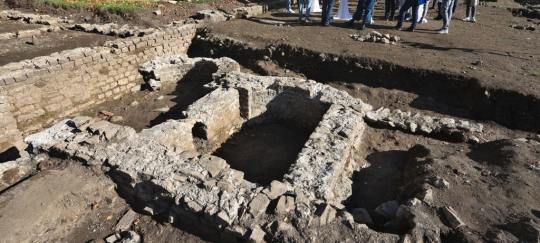


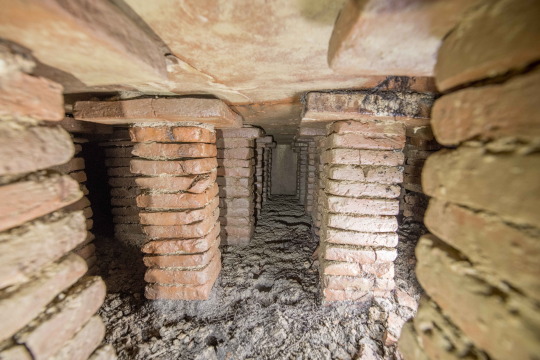
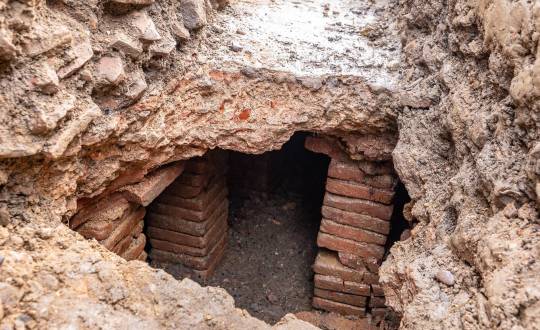
2,000-year-old luxury Roman villa with “underfloor heating” found in Germany
A luxury Roman villa with a thermal bath and underfloor heating has been unearthed in Kempten, Bavaria, one of the oldest settlements in Germany.
Ancient Romans lived in homes with thermal baths and underfloor heating, as evidenced by an excavation in the Bavarian town of Kempten. The uncovered house is one of the oldest in Germany.
The Domus was large, at least 800 square meters over two stories, and was situated close to the temple district, the most coveted area of the ancient city, on the western edge. It had screed floors, frescoed walls, and private hot baths with hypocaust heating under the floor.
When presenting the excavation, the city reported that the remains that had come to light were among the oldest in Germany. Due to its Roman past, Kempten is more than 2000 years old, making it one of the oldest cities in Germany.
The most exciting thing about the finds for the archaeologists: They belonged to private stone houses. “You won’t find such private buildings in stone anywhere in southern Germany at this early time – at the beginning of the first century,” says Johannes Schiessl from the city archeology department of Kempten. That means: while elsewhere the Roman settlers still lived in wooden and clay buildings, the high society in Cambodunum apparently already resided in chic brick townhouses.
Cambodunum is the oldest German city mentioned in writing. In 15 B.C., Nero Claudius Drusus Germanicus, the father of the Germanicus typically associated with that cognomen, and his brother Tiberius razed a Celtic settlement on the site of what would later become Kempten, founded Cambodunum.
The city of Cambodunum was built in the first decade of the new millennium on a typical Roman grid plan, with major public buildings such as baths, temples, and a forum. It served as the region’s administrative center and the residence of the Roman governor of the Roman province of Raetia. Cambodunum remained the province’s capital until 120 A.D., when it was replaced by Augsburg, aka the Roman colony of Augusta Vindelicum.
The discovery of the luxury private Domus underscores that the Romanization of Bavaria, the development of an urban culture mirroring Rome’s, began in Kempten. It also demonstrates that the wealthy homes and significant civic structures in the early city, which were thought to have been constructed primarily of wood, were built with fine stone and brick.
By Leman Altuntaş.
#2000-year-old luxury Roman villa with “underfloor heating” found in Germany#Kempten Bavaria#ancient home#ancient artifacts#archeology#archeolgst#history#history news#ancient history#ancient culture#ancient civilizations#roman history#roman empire
18 notes
·
View notes
Text
Explaining One of VTMB Paintings (part 15)
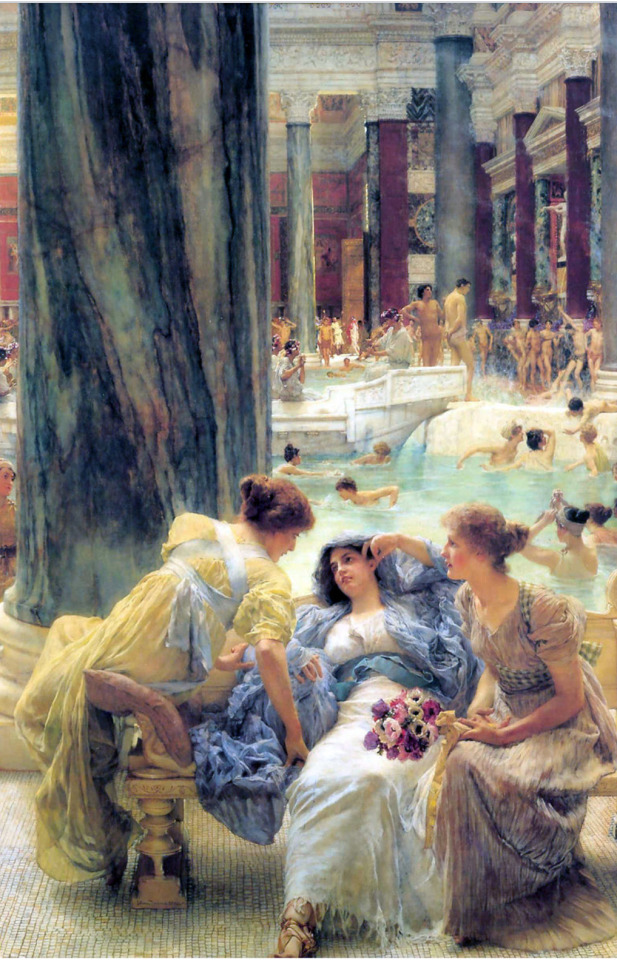
The Baths of Caracalla, oil on canvas (1899) by Sir Lawrence Alma-Tadema
Sir Lawrence Alma-Tadema(Jan 8 1836- Jun 25 1912) was a Dutch painter born in Dronryp , Netherlands and later became a UK denizen(an old legal status were you were able to own land and like in the UK without being a Citizen but still enjoying most of the rights). His art styles include both Romanticism (which this painting is) and Neoclassical.Before 1860s many of his works were of Merovingian subjects(Merovingian Dynasty was a Frankish(Germanic people who lived in what’s now part of Modern day France) ruling family in power from the mid 5th century to 751). His painting The Clotilde and the Tomb of her Grandchildren [1859 ](see below) is an example of Merovingian subject matter in a NeoClassical style. Despite his foundness Merovingian subject was not very popular on the international art market so he switched to painting focused on more popular subjects to depict in his artwork mostly focused on as historic/ ancient Egyptian, Roman and Greek subjects and events.
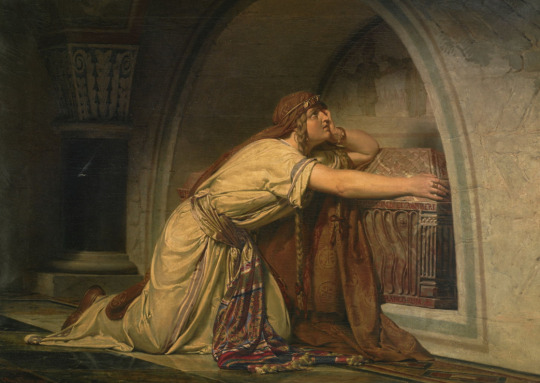
The Clotilde and the Tomb of her Grandchildren, oil on canvas (1858) by Sir Lawrence Alma-Tadema
Romantic art focused on emotions, feelings, and moods of all kinds including spirituality, imagination, mystery, and fervor. The subject matter varied widely including landscapes, religion, revolution, and peaceful beauty. The brushwork for romantic art became looser and less precise. The great Romantic artist Caspar David Friedrich summed up Romanticism saying "the artist's feeling is his law".
The Baths of Caracalla is a real Roman public bath built in Rome, Italy (the second largest in the city) sometime between 212 AD and 217 AD and was in operation until around 537 AD when it fell into disuse. The paining shows the historical imagination of what the baths would have looked like during the height of its popularity as it would be a major social space public space.
Historically Roman public baths acted as community centers where free and included access to a wide verity of atonal features such as gymnasiums for men to exercise; statues, murals and other public works of art; restaurants to buy multiple types of food and even a library that allowed everyday Roman citizens access to literature works they wouldn’t be able to offers to buy. Roman Public baths acted as not only bath houses but as a Library, gym, spa, restaurant and public art gallery. The waters of the baths were heated by a hypocaust, a heating system where coal and wood is burned under the ground.
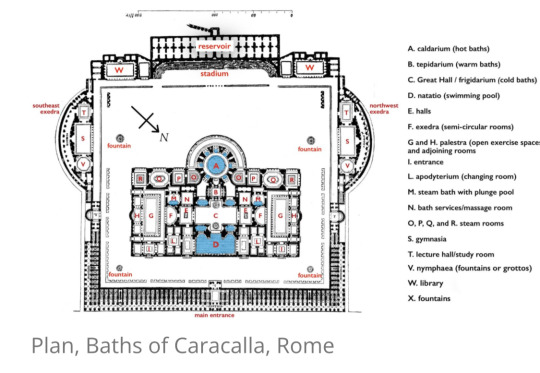

The baths were most likely built by emperor Septimius Severus (part of the Severan Family) as they are located in the southern part of Rome where during that time members of Severan family were known to commission a number of public works in that specific area of the city for political favor. The site the baths were built on where originally part of a Garden estate known as horti Asiniani by Gaius Asiniani Pollio during the reign of Augustus( first emperor of Rome 63 BC to 14 AD, so about 200 to 260 years before the construction of the baths). The Garden was home to a number of sculptures such as the Farnese Bull which were kept as part of the public art displays of the baths when they were in use. During the height of its popularity the baths are estimated to have a daily capacity of 6,000 to 8,000 visitors a day.

Farnese Bull, marble sculpture (2nd century BC) by Apollonius of Tralles
Even after falling into ruin the Caracalla baths still found use as in the 14th century a Christian pilgrim site was set up near by due to the proximity to the Church of Saint Nereo e Achilleo( built facing the baths in the 4th century) and was used by the pilgrims as their main water source. But in 537 AD during the war of the Gothic war the city’s water supply was cut by Vitiges of the Ostrogoths and the baths were once again abandoned.
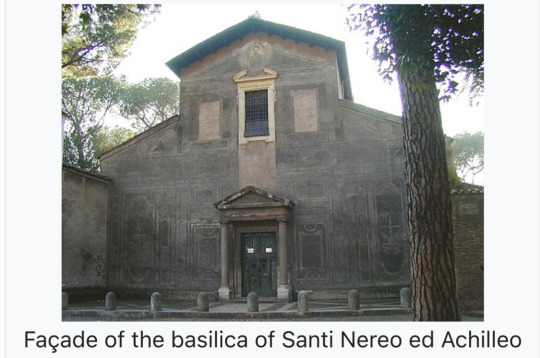
During the 6th and 7th century the baths were still in the very sparely populated area of Rome and were used to burry pilgrims who died in the xenodochium ( hospital specifically for treatment of foreign pilgrims) of the Church of Saint Nereo e Achilleo. Then starting in the 12 century the baths were used as a quarry for stone and decorative masonry that were often used in the construction of churches. In the 15th century Pope Pius II used stone from the baths in the construction of the Loggia of the Benediction (fancy decorative balcony used by the Pope) at St Peters Basilica, Vatican City. (See photo below)

it wasn’t until the 16th and 18th century when interest in restoring the Baths as a historic site began. With the excavation of the baths beginning in 1824 by Count Egidio di Velo.
The Baths of Caracalla have been a popular subject of a number of different art works over the years by a wide number of artist who ether are depicting historical scenes of artist imaginations of the baths in its prime or capturing architectural beauty that remained even after it fell into ruin. (see examples below)

Baths of Caracalla Rome: interior of the Tepidarium, watercolor (1845) C.R. Cockerell and assistant Jackson used in lecture of architecture. Image based on illustration based of detailed restoration done on the baths found in a book published by French architect G.A Blouet in 1828.

Interior of the Baths of Caracalla, print if etching with watercolor and gouache(circa 1780) by Swis painter and engraver Abraham-Louis-Rodolphe Ducros.
#vampire the masquerade bloodlines#VTMB#explaining one of vtmb paintings#art history#romanticism#The baths of Caracalla#Ancient Roman#Sir Lawrence Alma-Tadema
1 note
·
View note